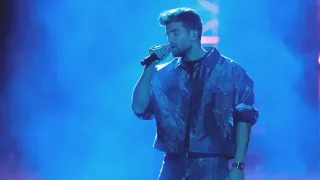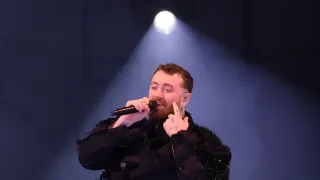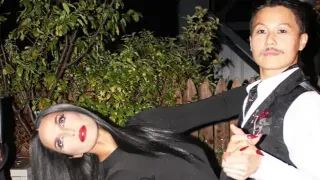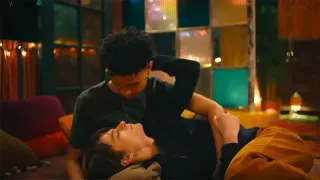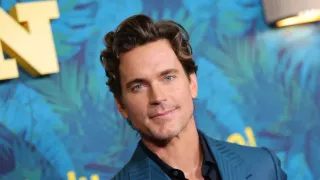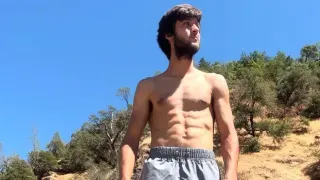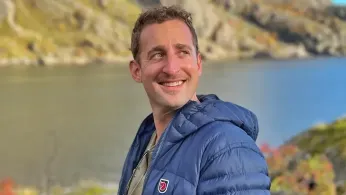
6 hours ago
From Navy Secrets to Seattle Firehouse Pride: Lance Garland's"Out There" Rewrites the Coming-Out Story
READ TIME: 5 MIN.
Lance Garland doesn't fit neatly into boxes—and that's precisely the point. A firefighter. A writer. A veteran. A mountaineer. An openly gay man who refused to stay silent in spaces designed to keep people like him invisible. His forthcoming memoir,"Out There: Dispatches from My Personal Wilderness," arriving October 7, 2025, isn't just another coming-of-age story about a queer person finding their footing in a hostile world. It's a meditation on what it means to be authentically yourself when the institutions around you are built on secrecy and shame.
The title itself carries multiple meanings—a phrase that evokes both the physical wilderness of the Pacific Northwest and the social wilderness of being visibly queer in hypermasculine professions. Garland spent years navigating both, and his book is the result of that hard-won wisdom.
Garland's story begins in a fundamentalist household in Federal Way, Washington, where he grew up before enlisting in the Navy as a nineteen-year-old determined to prove himself. He worked tirelessly to qualify for Navy SEAL training, driven by a desire to serve and, perhaps unconsciously, to find a place where he belonged. What he found instead was a contradiction at the heart of American military culture: a system that needed him and men like him, but demanded they disappear.
During his service, Garland met his first boyfriend aboard a warship—a connection that felt like possibility in an impossible situation. That possibility was shattered when his partner was sexually assaulted by a superior officer. What followed was a court-martial complicated by the military's"Don't Ask, Don't Tell" policy, a hypocritical 1993 Defense Department regulation that permitted lesbian and gay people to serve while forbidding them from being openly honest about their identities.
"I faced some big challenges during that time," Garland reflected in an interview."You have really negative side effects of being honest." The experience left deep scars, but it also crystallized something in him: a refusal to let institutions dictate his truth.
After his discharge from the Navy, Garland discovered that the wilderness offered something the military never could—a space where he could simply be. He spent years sailing, backpacking, and climbing in the Pacific Northwest, using these experiences as a pathway to healing from the trauma of his youth. Nature became his therapist, his refuge, his teacher.
But Garland wasn't content to heal in isolation. He pursued higher education at the University of Washington, studying creative writing—a deliberate choice to develop the tools he'd need to tell stories that mattered. Upon graduation, he made an unconventional decision: he launched two careers simultaneously. As a firefighter and as a writer, he committed to the same mission in different arenas: creating visibility and possibility for people who had been told they didn't belong.
"Writing is a way to try and give back, especially to the Gay community," Garland explained."I try to focus on writing that fills a hole that wasn't previously filled, kind of like in firefighting."
When Garland became Seattle's first openly gay firefighter, he wasn't naive about what that meant."It's harder automatically if you're the only one," he acknowledged."You have all these questions, like'Is it safe? Will it go well? Is this going to be a negative for me?'"
Yet he chose visibility anyway—a radical act in an institution steeped in hypermasculinity and tradition. What made that choice possible was community. Garland credits the support of Seattle's Capitol Hill neighborhood, the broader LGBTQ+ community, and the city itself for creating an environment where he could take that risk. He was part of the marriage equality movement in Washington State, attending crucial organizing meetings at St. Mark's Cathedral on Capitol Hill, fighting for the legal recognition of queer relationships.
"I would never have felt comfortable being a firefighter without the support of my community, Cap Hill, and the city of Seattle," Garland said. That statement deserves to sit with us for a moment. It's a reminder that individual acts of courage don't happen in a vacuum—they're made possible by collective struggle, by communities that show up for one another, by cities that choose to be better.
In recent years, Garland has become known for his mountaineering expeditions, most notably leading the first queer climbing team to the Matterhorn in an expedition that began July 19 and concluded August 5, 2024, an achievement for which he received the 2024 Pathfinder Prize and a Catalyst Grant from the American Alpine Club. His climbing isn't just a personal pursuit—it's become a powerful metaphor for the queer experience itself.
"So often, our lives as Queer people, we're just reaching out, trying to find something stable and sure to keep us safe," Garland reflected."We need the person on the end of the rope to keep us safe. We're tied to our partners in the community for survival. We get further and go higher when we're doing it together."
This is where Garland's work transcends the personal memoir genre. He's articulating something essential about queer survival and thriving—that our liberation is collective, that visibility requires mutual support, that we quite literally keep each other alive.
Garland's published work has appeared in prestigious outlets including Outside Magazine, Travel & Leisure, Backpacker, Orion, and Climbing Magazine, among others. His article"The Last of The Firewatchers" was listed among Outside's Best Stories, while his expedition piece"Beyond the False Summit" won the 2024 Pathfinder Prize and recognition from the American Alpine Club. He's been honored with a fellowship at The Banff Center's Mountain Writing Residency and recognized in"The Best American Journalism" and"Best Backpacker Stories of All Time" anthologies.
These accolades aren't mere decoration—they signal that mainstream media institutions are finally making space for queer voices in outdoor and adventure writing, spaces historically dominated by straight, often white, male narratives. Garland's work is helping to reshape what"adventure" means and who gets to be seen as an adventurer.
"Out There: Dispatches from My Personal Wilderness" arrives at a particular cultural moment. LGBTQ+ rights have advanced in many ways since the days of"Don't Ask, Don't Tell," yet queer people continue to face discrimination, erasure, and violence. The book serves as both a personal reckoning and a cultural document—a reminder that the fight for inclusion and authenticity isn't over, and that visibility remains a radical, necessary act.
Garland is embarking on a book tour, beginning with a free event at Third Place Books' Ravenna location in Seattle, where he'll discuss his memoir in conversation with the community that supported his journey.
Lance Garland's life and work matter because they demonstrate that queer people don't just survive in hostile institutions—we transform them. We bring our full selves, our creativity, our resilience, and our refusal to be silent. We create pathways for those who come after us. We write the stories that haven't been told. We climb mountains and fight fires and sail seas, not despite being queer, but as fully integrated expressions of who we are.
"Out There" is an invitation to readers who have felt like outsiders, who haven't found their place yet, to see themselves reflected in someone else's journey toward authenticity. It's a testament to the power of visibility, the necessity of community, and the possibility of living a life that's genuinely, unapologetically yours.
